Western Culture精简
西方文化 英语作文
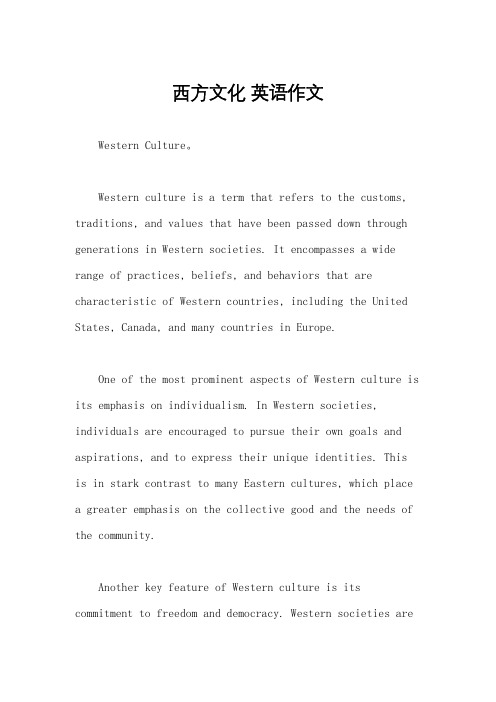
西方文化英语作文Western Culture。
Western culture is a term that refers to the customs, traditions, and values that have been passed down through generations in Western societies. It encompasses a wide range of practices, beliefs, and behaviors that are characteristic of Western countries, including the United States, Canada, and many countries in Europe.One of the most prominent aspects of Western culture is its emphasis on individualism. In Western societies, individuals are encouraged to pursue their own goals and aspirations, and to express their unique identities. This is in stark contrast to many Eastern cultures, which place a greater emphasis on the collective good and the needs of the community.Another key feature of Western culture is its commitment to freedom and democracy. Western societies arefounded on the principles of liberty, equality, and justice, and are dedicated to protecting the rights of their citizens. This commitment is reflected in the political systems of Western countries, which are often characterized by free and fair elections, independent judiciaries, and a strong emphasis on human rights.In addition to these values, Western culture is also known for its rich artistic and intellectual heritage. Western societies have produced some of the world's most influential and enduring works of art, literature, music, and philosophy. From the paintings of Leonardo da Vinci to the plays of William Shakespeare, Western culture has madea profound impact on the world of art and ideas.Of course, Western culture is not without its flaws. Critics argue that Western societies can be overly materialistic, individualistic, and consumerist, and that they have often failed to live up to their professed ideals of freedom and equality. Moreover, some argue that Western culture has been responsible for the spread of harmful practices, such as imperialism, colonialism, andenvironmental degradation.Despite these criticisms, Western culture continues to exert a powerful influence on the world stage. Its values and ideas have spread across the globe, shaping the way people think, behave, and interact with one another. Whether it is through the spread of democracy, the popularity of Western fashion and entertainment, or the global reach of Western corporations, Western culture continues to leave its mark on the world.In conclusion, Western culture is a complex and multifaceted phenomenon that encompasses a wide range of values, beliefs, and practices. While it is not without its flaws, Western culture has made a profound impact on the world, shaping the way people think, behave, and interact with one another. Whether it is through its commitment to individualism, its dedication to freedom and democracy, or its rich artistic and intellectual heritage, Westernculture continues to play a significant role in shaping the global community.。
关于西方文化英语作文
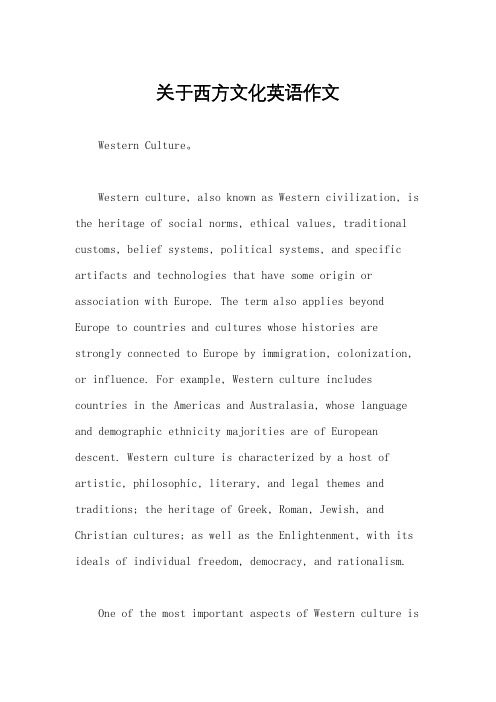
关于西方文化英语作文Western Culture。
Western culture, also known as Western civilization, is the heritage of social norms, ethical values, traditional customs, belief systems, political systems, and specific artifacts and technologies that have some origin or association with Europe. The term also applies beyond Europe to countries and cultures whose histories are strongly connected to Europe by immigration, colonization, or influence. For example, Western culture includes countries in the Americas and Australasia, whose language and demographic ethnicity majorities are of European descent. Western culture is characterized by a host of artistic, philosophic, literary, and legal themes and traditions; the heritage of Greek, Roman, Jewish, and Christian cultures; as well as the Enlightenment, with its ideals of individual freedom, democracy, and rationalism.One of the most important aspects of Western culture isits emphasis on individualism. Western societies tend to place a high value on individual rights, freedoms, and achievements. This can be seen in the emphasis on personal success and self-expression in Western art, literature, and popular culture. In Western countries, individuals are encouraged to pursue their own goals and dreams, and to express themselves in unique and creative ways.Another key aspect of Western culture is its commitment to democracy and the rule of law. Western societies have developed systems of government that are based on the principles of individual rights, equality before the law, and the consent of the governed. This has led to the establishment of democratic institutions and the rule of law in many Western countries, which are designed toprotect the rights and freedoms of individuals and to ensure that power is exercised responsibly and accountably.Western culture also places a high value on education and the pursuit of knowledge. This can be seen in the emphasis on scientific inquiry, critical thinking, and intellectual curiosity in Western academic institutions.Western societies have a long tradition of supporting and promoting education, and many of the world's leading universities and research institutions are located in Western countries.In addition, Western culture has had a significant impact on the development of global capitalism and consumerism. Western countries have been at the forefront of the development and spread of capitalist economic systems, which emphasize free markets, private property, and individual entrepreneurship. This has led to the creation of a global economy that is driven by consumer demand and the pursuit of profit, and has had far-reaching effects on the cultures and economies of countries around the world.However, it is important to recognize that Western culture is not monolithic, and that it encompasses a wide range of diverse traditions, beliefs, and practices. Western societies are home to a rich tapestry of cultural, ethnic, and religious diversity, and there is no single "Western culture" that can be easily defined orcharacterized. It is important to approach the study of Western culture with an open mind and a willingness to engage with its complexities and contradictions.In conclusion, Western culture is a complex and multifaceted phenomenon that has had a profound impact on the world. Its emphasis on individualism, democracy, education, and capitalism has shaped the values and institutions of many societies, and its influence can be seen in the arts, literature, and popular culture of countries around the globe. However, it is important to approach the study of Western culture with a critical and open-minded perspective, and to recognize the diversity and complexity of its traditions and practices.。
英语拓展模块unit 7《western culture》ppt课件(1)
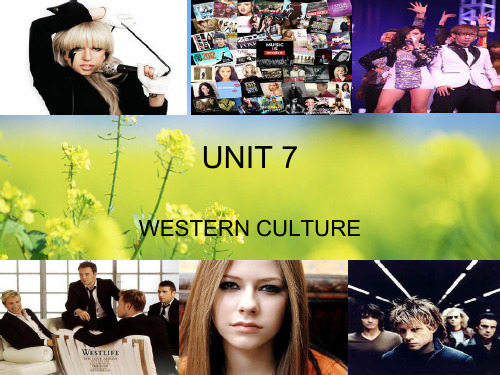
contribute……to 有助于,促使
She contributes greatly to the movie.
Fresh air contributes to good health.
establish 建立
Our school was established in 1986.
profit 利润,利益 make profits 创利润
His song is so infectious that many audience burst into tears.
The lung disease is infectious among people.
abstract 抽象的
These pictures are very abstract.
They made a big profit by selling fake goods.
continue 继续做某事
You should continue to learn English.
jazz
Grammar: infinitive or V-ing after a verb
不定式或动词ing形式 在动词后的用法
He stopped to smoke. 他停下来吸烟。
I remember locking the door. 我记得把门锁上了。 Remember to lock the door. 记着要锁门。
I forgot meet her. 我忘记去见他了。 Have you forgotten meeting her? 你忘记曾见过她了吗?
在下列动词之后可以用不定式也可以用动 词的-ing形式做宾语,在意思上区别不大。
attempt, begin, continue, fear, hate,
Western Culture
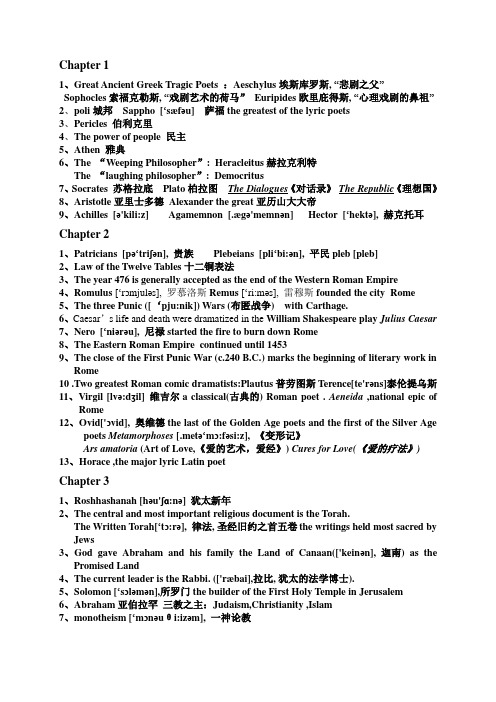
Chapter 11、Great Ancient Greek Tragic Poets :Aeschylus埃斯库罗斯, “悲剧之父”Sophocles索福克勒斯, “戏剧艺术的荷马”Euripides欧里庇得斯, “心理戏剧的鼻祖”2、poli城邦Sappho[…sæfəu] 萨福the greatest of the lyric poets3、Pericles伯利克里4、The power of people民主5、Athen 雅典6、The “Weeping Philosopher”:Heracleitus赫拉克利特The “laughing philosopher”:Democritus7、Socrates 苏格拉底Plato柏拉图The Dialogues《对话录》The Republic《理想国》8、Aristotle亚里士多德Alexander the great亚历山大大帝9、Achilles[ə'kili:z] Agamemnon[.ægə'memnən] Hector[…hektə], 赫克托耳Chapter 21、Patricians[pə…triʃən], 贵族Plebeians[pli…bi:ən], 平民pleb [pleb]2、Law of the Twelve Tables十二铜表法3、The year 476 is generally accepted as the end of the Western Roman Empire4、Romulus [‘rɔmjuləs], 罗慕洛斯Remus [‘ri:məs], 雷穆斯founded the city Rome5、The three Punic ([‘pju:nik]) Wars (布匿战争) with Carthage.6、Caesar’s life and death were dramatized in the William Shakespeare play Julius Caesar7、Nero[…niərəu], 尼禄started the fire to burn down Rome8、The Eastern Roman Empire continued until 14539、The close of the First Punic War (c.240 B.C.) marks the beginning of literary work inRome10 .Two greatest Roman comic dramatists:Plautus普劳图斯Terence[te'rəns]泰伦提乌斯11、Virgil [lvə:dʒil] 维吉尔a classical(古典的) Roman poet . Aeneida ,national epic ofRome12、Ovid['ɔvid], 奥维德the last of the Golden Age poets and the first of the Silver Agepoets Metamorphoses [.metə…mɔ:fəsi:z], 《变形记》Ars amatoria (Art of Love,《爱的艺术,爱经》) Cures for Love(《爱的疗法》) 13、Horace ,the major lyric Latin poetChapter 31、Roshhashanah [həu'ʃɑ:nə]犹太新年2、The central and most important religious document is the Torah.The Written Torah[…tɔ:rə], 律法, 圣经旧约之首五卷the writings held most sacred by Jews3、God gave Abraham and his family the Land of Canaan(['keinən], 迦南) as thePromised Land4、The current leader is the Rabbi. (['ræbai],拉比, 犹太的法学博士).5、Solomon […sɔləmən],所罗门the builder of the First Holy Temple in Jerusalem6、Abraham亚伯拉罕三教之主:Judaism,Christianity ,Islam7、monotheism […mɔnəuθi:izəm], 一神论教8、The three patriarchs[…peitriɑ:k]族长:Abraham, 亚伯拉罕Isaac, […aizək], 以撒, 亚伯拉罕之子Jacob, 雅各布Joseph, who is recognized as a fourth patriarch by Christians is not considered one by Jews.9、the Mosaic Law10、the Northern kingdom of Israel ([…izreiəl], 以色列王国)the Southern kingdom of Judah (['dʒu:də], 犹太王国)Chapter 41、Christianity started by Jesus’disciples [di’saipl], 门徒,弟子Paul (apostle[ə…pɔsl], 传教者)2、Christianity began as a Jewish sect in the eastern Mediterranean in the mid-1stcentury.3、The Holy Land:Jerusalem耶路撒冷4、Emperor Constantine‟s Edict of Milan5、At some point during the 4th Century the Bishop(主教) of Rome adopted the title of “Pope”(教皇)claimed all Christians to be under his authority6、John Wycliffe was the first person to translate the Bible into the English language.7、The Four Gospels:Matthew, 《马太福音》Mark, 《马可福音》Luke, 《路加福音》John, 《约翰福音》8、Santa Maria delle Grazie圣玛利亚修道院(圣玛丽亚感恩教堂)“The Last Supper Church”Chapter 51、The Church(教会组织) was the single most important institution of the Medievalworld.2、The “black death”, but its origin is most generally referred to China3、The Functions of the Church:1. took over the role of protector of culture.2. provided the framework for Medieval life.3. spread itself and insured that everyone followed the rules correctly.4、Influence of the Norman ConquestThe conquest was formerly thought to have brought about broad changes in all phases of English life.1. The establishment of feudalism in England2. The Norman way of life & French civilization3. A strong centralized Norman government4. The Norman nobility displaced the Anglo-Saxon nobility of England.5. Confiscation of the lands of the English lordsChapter 61、The Renaissance(文艺复兴)started in Florence(佛罗伦萨) & Venice(威尼斯)2、Humanism, 人文(本)主义the essence of the RenaissancePetrarch,['pi.tra:k] 彼得拉克is regarded as the Father of Humanism3、Three towering figures in art world:Leonardo da Vinci, 达芬奇Michelangelo, 米开朗基罗Raphael, 拉斐尔4、Three towering figures in literature world:Dante,但丁Petrarca,彼得拉克Boccaccio,薄伽丘5、Francis Rabelais, 拉伯雷Gargantua《巨人传》Chapter 71、The core of Enlightenment thinking: three important concepts1. Methods of natural science should be used to examine and understand life in all itsaspects. Enlightenment thinkers referred to this as reason, often called ration.2. The laws of human society could be discovered by application of the scientificmethod, much like the laws of nature.3. Progress.2、“What is Enlightenment?” (1784), Kant(康德)3、Louis XIV of France法国国王路易十四known as Louis the Great or the Sun King4、The Natural rights that Mankind have inborn: life, 生命权liberty, 自由权property (estate), 财产权5、“Cogito ergo sum”French: Je pense, donc je suis.English: I think, therefore I am.Chinese:我思故我在。
英语作文西方文化

英语作文西方文化Western Culture。
Western culture refers to the culture of Western countries, including the United States, Canada, Western Europe, Australia, and New Zealand. It is a rich and diverse culture that has had a significant impact on the world in terms of art, literature, music, philosophy, and more.One of the defining characteristics of Western culture is its emphasis on individualism. In Western societies, the individual is often seen as the primary unit of society, and there is a strong emphasis on personal freedom and autonomy. This can be seen in the political and economic systems of Western countries, which are often based on the principles of democracy and free market capitalism.Another important aspect of Western culture is its focus on rationality and scientific inquiry. Westernsocieties have a long tradition of valuing reason and evidence-based thinking, which has led to significant advancements in fields such as medicine, technology, and engineering. This emphasis on rationality can also be seen in Western philosophy, which has produced influential thinkers such as Descartes, Kant, and Nietzsche.Art and literature are also central to Western culture. Western art has a long and rich history, with movements such as the Renaissance, Baroque, and Romanticism producing some of the world's most iconic works of art. Similarly, Western literature has produced some of the most enduring and influential works in human history, from Shakespeare's plays to the novels of Jane Austen and Mark Twain.Music is another important aspect of Western culture. Western music has a wide range of styles and genres, from classical to rock to hip-hop, and has had a significant impact on global music trends. Western musicians such as Beethoven, The Beatles, and Madonna have achieved international fame and have left a lasting legacy on the world of music.In addition to art, literature, and music, Western culture also encompasses a wide range of traditions and customs. Western holidays and celebrations, such as Christmas, Easter, and Thanksgiving, are celebrated around the world, and Western cuisine, including dishes such as hamburgers, pizza, and pasta, has become popular in many countries.Overall, Western culture is a complex and multifaceted phenomenon that has had a profound impact on the world. Its emphasis on individualism, rationality, and artistic expression has shaped the way people think, live, and interact with each other, and its influence can be seen in almost every aspect of modern global culture. Whether it is through its art, literature, music, or traditions, Western culture continues to be a vibrant and influential force in the world today.。
西方文化英语作文介绍模板
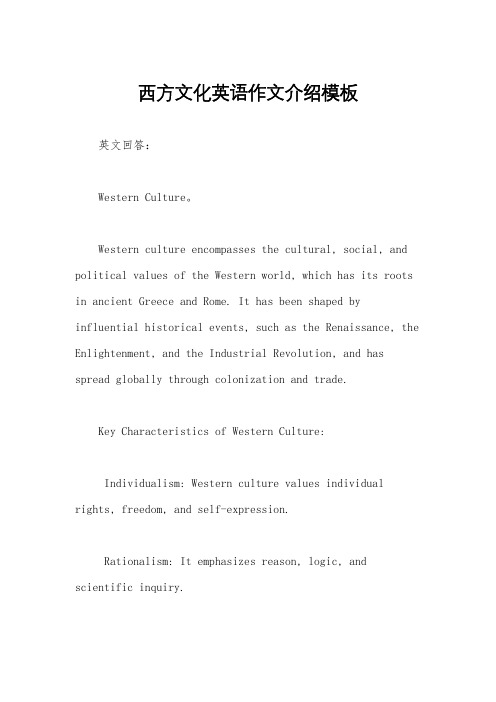
西方文化英语作文介绍模板英文回答:Western Culture。
Western culture encompasses the cultural, social, and political values of the Western world, which has its roots in ancient Greece and Rome. It has been shaped byinfluential historical events, such as the Renaissance, the Enlightenment, and the Industrial Revolution, and has spread globally through colonization and trade.Key Characteristics of Western Culture:Individualism: Western culture values individual rights, freedom, and self-expression.Rationalism: It emphasizes reason, logic, andscientific inquiry.Secularism: Western culture generally separatesreligion from the state and promotes tolerance of different beliefs.Democracy: It values representative government, civil liberties, and human rights.Materialism: Western culture places importance on economic growth, technological advancement, and consumerism.Influence of Western Culture:Western culture has had a profound impact on global affairs. It has:Shaped political systems and economic models worldwide.Influenced art, music, literature, and cinema.Spread scientific and technological advancements.Promoted human rights and civil liberties.Challenges to Western Culture:In recent decades, Western culture has faced challenges, including:Globalization and multiculturalism.The rise of fundamentalism and authoritarianism.Economic inequality and environmental degradation.中文回答:西方文化。
介绍西方文化 英语作文

介绍西方文化英语作文Western culture is incredibly diverse and rich, encompassing various traditions, customs, arts, and values. 西方文化非常多样丰富,包括各种传统、风俗、艺术和价值观。
From music and fashion to literature and food, Western culture has greatly influenced societies around the world. 从音乐和时尚到文学和食物,西方文化对世界各国的社会产生了深远影响。
One of the most prominent aspects of Western culture is its emphasis on freedom and individualism. 西方文化最明显的特点之一是强调自由和个人主义。
This can be seen in the democratic political systems of many Western countries, as well as in the importance placed on personal choice and autonomy in everyday life. 这可以在许多西方国家的民主政治体制中看到,也可以在日常生活中个人选择和自主决定的重要性中体现出来。
Art and literature play a significant role in Western culture, with renowned artists and writers such as Leonardo da Vinci, Shakespeare, and Van Gogh shaping the artistic landscape. 艺术和文学在西方文化中扮演着重要角色,著名艺术家和作家如达芬奇、莎士比亚和梵高塑造了艺术风景。
Western Culture简介

Historical records of Western culture in Europe begin with Ancient Greece and Ancient Rome. Western culture continued to develop with Christianization during the Middle Ages, with the reform and modernization triggered by the Renaissance, and with globalization by successive European empires, that spread European ways of life and European educational methods around the world between the 16th and 20th centuries. European culture developed with a complex range of philosophy, medieval scholasticism and mysticism, and Christian and secular humanism. Rational thinking developed through a long age of change and formation, with the experiments of the Enlightenment, and breakthroughs in the sciences. With its global connection, European culture grew with an all-inclusive urge to adopt, adapt, and ultimately influence other cultural trends around the world.
中西文化差异英文简短

中西文化差异英文简短中西文化差异是一个复杂而广泛的话题,以下是一些简短的英文描述:1.Value Systems(价值体系): Western culture emphasizes individualism, independence, and personal achievements, while Chinese culture highlights collectivism, interdependence, and harmony within the group.2.Communication Styles(交流方式): Direct and assertive communication is preferred in Western cultures, whereas indirect and polite communication is valued in Chinese culture to maintain social harmony.3.Time Orientation(时间观念): Western cultures tend to be future-oriented, emphasizing planning and scheduling, while Chinese culture is more present-oriented, focusing on the importance of the moment and relationships.4.Social Etiquette(社交礼仪): In Western cultures, people often maintain a personal distance and privacy, while inChinese culture, there is a greater emphasis on social connections, networking, and saving face.5.Perception of Authority(权威观念): Western cultures generally have a more democratic approach and value challenging authority, whereas Chinese culture places a high degree of respect for elders, hierarchy, and tradition.请注意,这些只是一些一般性观察,并不能涵盖所有个体情况。
introduction of western culture欧洲文化简介

• 案例中沟通出现的主要障碍在中方负责商 务条款的成员无意中评论了中东盛行的伊 斯兰教。 • 这种障碍导致对方成员的不悦,不愿意与 中方合作 • 应该为此向对方成员道歉 • 中方谈判人员在谈判前应该了解对方的习 俗及喜好,避免类似与此情况再次发生, 正所谓知己知彼才能百战百胜。
填空
•
俄罗斯 • 人故意在谈判桌上发脾气,
• 岛国文化代表首推英国和日本。与海洋文 化相比,岛国文化尤有特点。岛国文化集 海洋文化与大陆文化之 特点,对内有很 强的凝聚力,对外又有很强的开放性。因 为对内凝聚,它具备了某些大陆文化的特 性;因为对 外开放,它又具有某种海洋 文化的特性。岛国一般面积不大,资源不 算丰富,虽有发展,余地不算很大。因为 资源不算丰富,所以增强了岛国人特有的 危机感;因为内部发展余地不大,所以又 增强了它们向外扩张的愿望 。
Questions for lesson 2
• 1. what forms the foundation of most European and American legal systems? Why? • 2. What must the witness do in the judicial procedure in the western world? • 3. What has been used by many famous Western writers? What are the works of John Milton?
2. What is civilization?
• In a broad way • In a narrow way
Is culture the same as civilization?
• Three points
介绍西方文化 英语作文

介绍西方文化英语作文Western culture is a broad and diverse concept that encompasses the customs, traditions, beliefs, and values of the people in Western countries. It is a culture that has been shaped by centuries of history, and it continues to evolve and influence the world in various ways. In this essay, I will provide an overview of Western culture from multiple perspectives, including its history, art and literature, religion, and social customs.First and foremost, Western culture has a rich and complex history that spans thousands of years. It has been influenced by various civilizations, including the ancient Greeks, Romans, and later the Byzantine and Ottoman empires. The Renaissance period in Europe also played a significant role in shaping Western culture, as it marked a time of great intellectual and artistic achievement. The Age of Enlightenment further propelled Western culture forward, as it emphasized reason, science, and individualism. These historical influences have left a lasting impact on Westernculture, shaping everything from its political systems toits artistic expressions.Art and literature are also integral parts of Western culture, with a long and storied tradition that has produced some of the world's most renowned works. From the epic poems of Homer to the plays of Shakespeare, Western literature has captivated audiences for centuries with its compelling storytelling and profound insights into the human experience. Similarly, Western art has produced masterpieces that continue to inspire and awe people around the world, from the paintings of Leonardo da Vinci to the sculptures of Michelangelo. These artistic achievementshave helped to define Western culture and have left an indelible mark on the global artistic landscape.Religion is another important aspect of Western culture, as it has played a significant role in shaping the beliefs and values of Western societies. Christianity, in particular, has been a dominant force in Western culture, influencing everything from its moral codes to its holidays and traditions. The influence of Christianity can be seenin the architecture of Western churches, the themes of Western art and literature, and the values that underpin Western societies. However, Western culture is also characterized by religious diversity, with other faiths such as Judaism, Islam, and various forms of paganism also contributing to its rich tapestry of beliefs and practices.In addition to its history, art and literature, and religion, Western culture is also defined by its social customs and traditions. From the concept of chivalry in medieval Europe to the emphasis on individualism and personal freedom in modern Western societies, there are certain values and norms that have come to define Western culture. The celebration of holidays such as Christmas and Easter, the tradition of Thanksgiving in the United States, and the practice of democracy and free speech are all examples of the unique customs and traditions that make up Western culture.Overall, Western culture is a complex and multifaceted phenomenon that encompasses a wide range of customs, traditions, beliefs, and values. It has been shaped bycenturies of history, and it continues to evolve and influence the world in various ways. From its rich and diverse artistic and literary traditions to its religious and social customs, Western culture is a vibrant and dynamic force that continues to captivate and inspire people around the world.。
介绍西方文化小英语作文
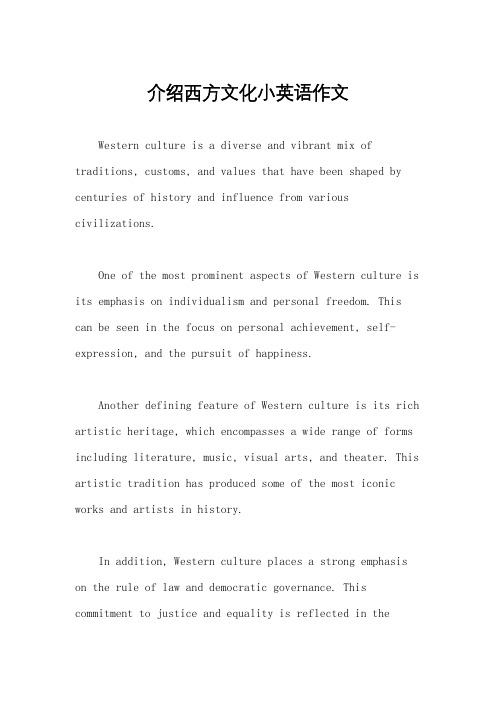
介绍西方文化小英语作文Western culture is a diverse and vibrant mix of traditions, customs, and values that have been shaped by centuries of history and influence from various civilizations.One of the most prominent aspects of Western culture is its emphasis on individualism and personal freedom. This can be seen in the focus on personal achievement, self-expression, and the pursuit of happiness.Another defining feature of Western culture is its rich artistic heritage, which encompasses a wide range of forms including literature, music, visual arts, and theater. This artistic tradition has produced some of the most iconic works and artists in history.In addition, Western culture places a strong emphasis on the rule of law and democratic governance. This commitment to justice and equality is reflected in thelegal systems and political institutions of Western societies.Furthermore, Western culture has a strong tradition of scientific inquiry and technological innovation. This hasled to major advancements in fields such as medicine, engineering, and information technology.Moreover, Western culture has a rich culinary tradition that varies widely from region to region. From Italianpasta to French pastries to American barbecue, the cuisineof the West is as diverse as its people.Finally, Western culture has a strong tradition ofsports and leisure activities, with a wide range of popular pastimes including football, basketball, skiing, and hiking.In conclusion, Western culture is a complex and multifaceted phenomenon that encompasses a wide range of traditions, values, and practices. Its rich history and diverse influences have shaped it into a dynamic and influential force in the world today.。
西方文化集锦英语作文

西方文化集锦英语作文Title: A Glimpse into Western Culture。
Western culture is a rich tapestry woven with various threads of traditions, values, and customs that have evolved over centuries. From its diverse cuisines to its vibrant arts scene, Western culture encompasses a wide array of elements that captivate and intrigue people around the globe. In this essay, we will delve into some key aspects of Western culture, shedding light on its uniqueness and significance.One of the defining features of Western culture is its emphasis on individualism and personal freedom. Unlike some Eastern cultures that prioritize the collective good over individual desires, Western societies place a high value on autonomy and self-expression. This can be observed in various facets of life, from the promotion of democratic ideals to the celebration of personal achievements.Language plays a crucial role in shaping Western culture, with English being the predominant language in many Western countries. As a lingua franca, English not only facilitates communication but also serves as a vehicle for cultural exchange and dissemination of ideas. The influence of English can be seen in popular culture, business, science, and technology, making it a truly global language.Another hallmark of Western culture is its richliterary tradition. From the timeless works of William Shakespeare to the modern novels of Toni Morrison, Western literature spans a vast spectrum of genres and styles. These literary works not only entertain but also offer profound insights into the human condition, exploring themes such as love, loss, and the search for meaning.Art and music are also integral parts of Western culture, reflecting its diversity and creativity. From the classical masterpieces of Mozart and Beethoven to the contemporary expressions of Andy Warhol and Banksy, Western art encompasses a wide range of movements and styles.Similarly, Western music encompasses genres as diverse as classical, jazz, rock, and hip-hop, each with its own unique characteristics and influences.Cuisine is yet another aspect of Western culture that delights and tantalizes the senses. From Italian pasta to French pastries, Western cuisine is renowned for its diversity and culinary innovation. Whether it's a hearty American barbecue or a sophisticated French meal, food plays a central role in Western social gatherings and celebrations.Sports also play a significant role in Western culture, serving as a source of entertainment, camaraderie, and national pride. From the excitement of football matches to the grace of figure skating, sports offer a means of both competition and community bonding. Major sporting events like the Olympics and the FIFA World Cup bring people together from different cultures and backgrounds, fostering a sense of unity and shared purpose.Religion has historically been a major influence onWestern culture, shaping its values, ethics, and social norms. While Christianity has been the dominant religion in many Western countries, there is also a rich tapestry of religious diversity, including Judaism, Islam, Buddhism, and various indigenous faiths. Religious holidays and traditions play an important role in Western societies, providing opportunities for reflection, celebration, and spiritual renewal.In conclusion, Western culture is a multifaceted mosaic of traditions, values, and customs that continue to evolve and adapt in a rapidly changing world. From its celebration of individualism and personal freedom to its rich artistic and culinary heritage, Western culture offers a glimpseinto the diversity and creativity of the human experience. As the world becomes increasingly interconnected, understanding and appreciating Western culture can foster greater cross-cultural understanding and dialogue.。
西方文化的特点英语作文
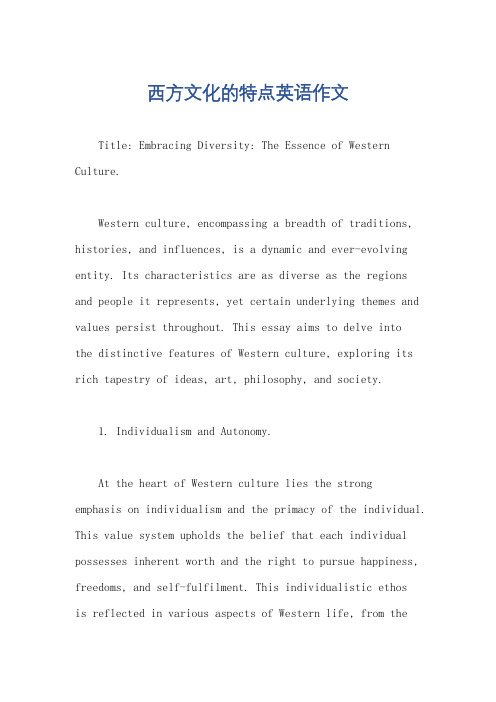
西方文化的特点英语作文Title: Embracing Diversity: The Essence of Western Culture.Western culture, encompassing a breadth of traditions, histories, and influences, is a dynamic and ever-evolving entity. Its characteristics are as diverse as the regions and people it represents, yet certain underlying themes and values persist throughout. This essay aims to delve intothe distinctive features of Western culture, exploring its rich tapestry of ideas, art, philosophy, and society.1. Individualism and Autonomy.At the heart of Western culture lies the strong emphasis on individualism and the primacy of the individual. This value system upholds the belief that each individual possesses inherent worth and the right to pursue happiness, freedoms, and self-fulfilment. This individualistic ethosis reflected in various aspects of Western life, from theeducation system that fosters critical thinking and independent problem-solving to the political systems that promote democratic participation and personal freedoms.2. Rationalism and Scientific Inquiry.Western culture has a long history of rationalism and scientific inquiry. The quest for knowledge and understanding through reason and observation has been a driving force in Western thought and civilization. This rationalist approach has led to groundbreaking scientific discoveries and technological advancements that have shaped the world we live in. The importance of evidence-based decision-making and continuous learning is integral to Western society.3. Emphasis on Progress and Improvement.Western culture is often characterized by a forward-looking orientation, with a strong belief in the potential for progress and improvement. This mindset is evident in the constant quest for innovation, excellence, andbetterment in all fields, whether it be science, technology, art, or society. Westerners are encouraged to question existing norms, challenge authority, and strive for continuous self-improvement.4. Pluralism and Diversity.Despite its individualistic bent, Western culture also values pluralism and diversity. It recognizes the richness and strength that arise from the intersection of different cultures, perspectives, and ideas. This tolerance for diversity is reflected in the policies and practices that aim to promote inclusivity, such as multicultural education and anti-discrimination laws. Western society strives to create spaces where everyone can feel valued and represented.5. Secularism and the Separation of Church and State.Another distinct feature of Western culture is the strong tradition of secularism, where the church and state are kept separate. This ensures the freedom of religion andthe neutrality of the government, allowing individuals to practice their faith freely without interference from the state. The separation of powers and the rule of law arealso integral to Western democratic systems, ensuring accountability and transparency in governance.6. Art and Aesthetics.Western culture boasts a rich history of art and aesthetics. From the masterpieces of the Renaissance to the experimental works of contemporary artists, Western art has always been a medium for self-expression, social commentary, and cultural understanding. Western culture also values beauty and creativity, fostering environments that nurture and celebrate artistic talent.In conclusion, Western culture is a mosaic of diverse traditions, values, and ideas that have shaped its unique identity. Its emphasis on individualism, rationalism, progress, pluralism, secularism, and artistry are just some of the characteristics that make Western culture vibrant, dynamic, and relevant in the global context. As we navigatethe complexities of the modern world, it is important to recognize and appreciate the rich contributions of Western culture while also remaining open to learning from other cultures and perspectives.。
西方文化了解的英语作文

西方文化了解的英语作文英文回答:Western culture is a rich and diverse tapestry that encompasses a wide range of traditions, beliefs, and values. One aspect of Western culture that I find particularly fascinating is its emphasis on individualism. In Western societies, individuals are encouraged to express their unique identities and pursue their own goals and aspirations. This can be seen in various aspects of Western culture, such as the emphasis on personal achievement, the celebration of individual rights and freedoms, and the encouragement of self-expression in art, fashion, and lifestyle choices.Another interesting aspect of Western culture is its strong emphasis on democracy and the rule of law. Western societies place a high value on the principles of equality, justice, and accountability. This can be seen in the democratic systems of government that are prevalent in manyWestern countries, where citizens have the right to vote and participate in decision-making processes. The rule of law ensures that everyone is subject to the same set of laws and regulations, regardless of their social status or position of power.Furthermore, Western culture is known for itsscientific and technological advancements. Western societies have made significant contributions to fields such as medicine, engineering, and information technology. This emphasis on innovation and progress has led to numerous breakthroughs and advancements that have greatly improved the quality of life for people around the world. For example, Western countries have pioneered the development of vaccines, medical treatments, and communication technologies that have revolutionized healthcare and connectivity.In addition, Western culture places a strong emphasis on education and intellectual pursuits. Western societies value knowledge, critical thinking, and intellectual curiosity. This can be seen in the emphasis on formaleducation, the availability of libraries and educational resources, and the promotion of lifelong learning. Western countries have renowned universities and researchinstitutions that attract students and scholars from all over the world, fostering a vibrant intellectual community.中文回答:西方文化是一个丰富多样的织锦,包含了各种传统、信仰和价值观。
西方文化 英语作文

Western culture refers to the culture of Western countries, including the United States, Canada, Western Europe, and Australia. As a major aspect of Western culture, the English language plays a significant role in international communication, , and entertainment. Here we will explore various aspects of Western culture and the influence of the English language.
Secondly, Western culture places a strong emphasis on equality and human rights. This is evident in movements for gender equality, racial justice, and LGBTQ+ rights. The English language also reflects this value through the use ofgender-neutral pronouns and inclusive language, which aim to promote equality and respect for all individuals.
Fourthly, Western culture values innovation and creativity, as seen in the technological advancements and artistic achievements that have emerged from Western countries. The English language has also adapted to this mindset, with the creation of new words and expressions to describe technological and cultural developments.
西方文化的英语作文
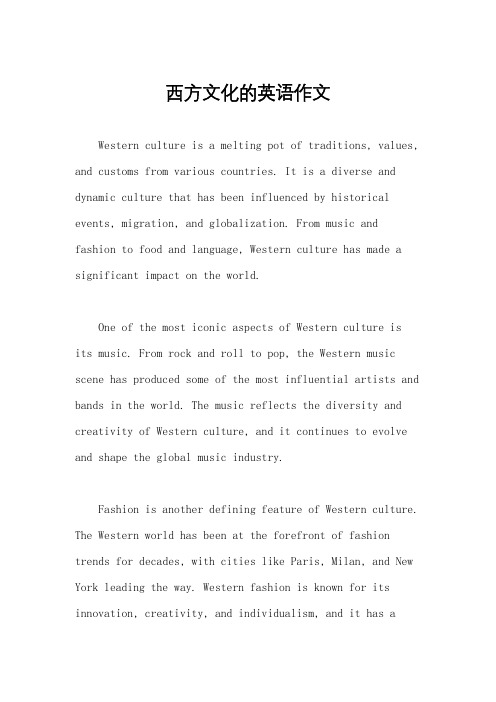
西方文化的英语作文Western culture is a melting pot of traditions, values, and customs from various countries. It is a diverse and dynamic culture that has been influenced by historical events, migration, and globalization. From music and fashion to food and language, Western culture has made a significant impact on the world.One of the most iconic aspects of Western culture isits music. From rock and roll to pop, the Western music scene has produced some of the most influential artists and bands in the world. The music reflects the diversity and creativity of Western culture, and it continues to evolve and shape the global music industry.Fashion is another defining feature of Western culture. The Western world has been at the forefront of fashion trends for decades, with cities like Paris, Milan, and New York leading the way. Western fashion is known for its innovation, creativity, and individualism, and it has asignificant influence on global fashion trends.When it comes to food, Western culture offers a wide variety of cuisines that are loved and enjoyed by peopleall over the world. From fast food to fine dining, Western cuisine reflects the diversity and multiculturalism of the region. It is not just about the food itself, but also the dining experience and the social aspect of eating together.The English language is a dominant force in Western culture and has become a global language of communication.It is the primary language of many countries in the Western world and is widely spoken and understood across the globe. The English language has had a profound impact on the world, shaping international business, education, and technology.Western culture is also known for its strong emphasison individualism and personal freedom. It celebrates the rights and freedoms of individuals, and it has played a significant role in shaping modern democratic societies.The Western world has been a pioneer in advocating for human rights, equality, and social justice.In conclusion, Western culture is a rich tapestry of traditions, values, and customs that have shaped the world we live in today. Its influence can be seen in music, fashion, food, language, and societal values. Western culture continues to evolve and adapt, reflecting the dynamic and diverse nature of the region.。
英语作文 中西方文化

英语作文中西方文化Western culture and Eastern culture are two distinctand diverse cultural systems. Western culture is known for its individualism, freedom, and emphasis on personal achievement, while Eastern culture values collectivism, tradition, and harmony. These cultural differences can be seen in various aspects of life, including social customs, family values, and communication styles.In terms of social customs, Western culture tends to be more open and direct, while Eastern culture often places a strong emphasis on politeness and respect for hierarchy.For example, in Western countries, it is common to address someone by their first name, while in many Eastern cultures, using titles and formal language is the norm.Family values also differ between the two cultures. In Western culture, independence and self-expression arehighly valued, and it is common for young adults to leave their parents' home and live on their own. In contrast, inmany Eastern cultures, family is considered the cornerstone of society, and multi-generational households are the norm.Communication styles also vary between Western and Eastern cultures. Westerners tend to be more direct and assertive in their communication, while Easterners often use indirect and implicit language to convey their thoughts and feelings. Additionally, nonverbal communication, such as body language and facial expressions, plays asignificant role in Eastern cultures.Despite these differences, it is important to recognize that both Western and Eastern cultures have their own unique strengths and values. By understanding and appreciating these cultural differences, we can foster greater cross-cultural understanding and cooperation.。
英语拓展模块unit 7《western culture》ppt课件(3)
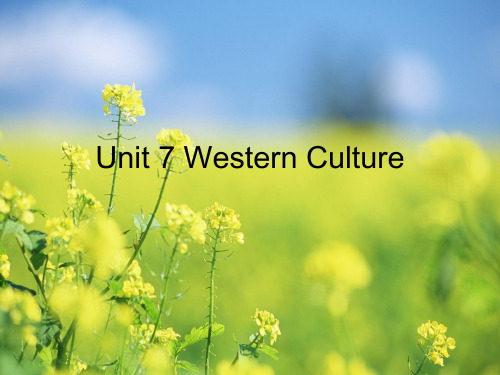
• Their infectious “有感染力的”“(指疾病 )传染的” music and witty lyrics made them two of the finest 20th–century songwriters. 他们那具有感染力的音乐和诙 谐的歌词,使他们成为二十世纪最优秀的 两位词曲作者。
How old are you? I’m six years old.
How old are you? I’m four years old.
How old are you? I’m three years old.
Homework
•1.回家大声朗读课 文10分钟。并且有 意识的去记单词。
• An infectious disease is one that can be passed from one person to another.
• 一种传染病就是从一个人传到另一个人的 疾病。
• Their lyrics gradually became more subtle and tender, like the song “Yesterday", and sometimes very abstract. 他们的歌词渐渐 变得比较难以捉摸和亲切,像“昨天”这 首歌那样,并且有时候很抽象。
• Plenty of fresh air contribute to good health. 充足的新鲜空气有助于身体健康。
• In 1982, Michael Jackson’s Thriller album became the biggest-selling record in history, and it established 建立,创建a new way for record companies to make profits创利润 by relying on依靠 a few big hits成功(演出,作品等) instead of many small ones.
- 1、下载文档前请自行甄别文档内容的完整性,平台不提供额外的编辑、内容补充、找答案等附加服务。
- 2、"仅部分预览"的文档,不可在线预览部分如存在完整性等问题,可反馈申请退款(可完整预览的文档不适用该条件!)。
- 3、如文档侵犯您的权益,请联系客服反馈,我们会尽快为您处理(人工客服工作时间:9:00-18:30)。
Classical Civilization
• Edward B. Tylor (1832-1917) asserts that the human mind and its capabilities are the same globally, despite a particular society’s stage in social evolution. He likens primitive cultures to “children”, and sees culture and the mind of humans as progressive.
Classical Civilization
-- Judeo-Christian
• The Bible
The sacred book of Christianity, a collection of ancient writings including the books of both the Old Testament and the New Testament. The Old Testament: The covenant of God with Israel as distinguished in Christianity from the dispensation(教规)of Jesus constituting the New Testament.
Classical Civilization
-- Judeo-Christian
• Judaism: The monotheistic religion of the Jews,
tracing its origins to Abraham and having its spiritual and ethical principles embodied chiefly in the Bible and the Talmud 《犹太法典》 • Christianity: The Christian religion, founded on the life and teachings of Jesus.
Western Cultures
• Western culture is made up of many elements, which have gone through changes over the centuries. • Two of these elements are considered to be more enduring: the Greco-Roman element and the Judeo-Christian element. • And there has been a complex interplay between the two, which adds to the richness of the culture.
Classical Civilization
-- Roman Culture • Famous Figures
Julius Caesar (100-44 B.C.): Roman general, statesman, and historian who invaded Britain (55), crushed the army of his political enemy Pompey (48), pursued other enemies to Egypt, where he installed Cleopatra as queen (47), returned to Rome, and was given a mandate by the people to rule as dictator for life (45). He was murdered by a group of republicans led by Cassius and Brutus, who feared he intended to establish a monarchy ruled by himself. (Men willing believe what they wish.)
The East-West Contrast
• The Greeks contrasted themselves to their Eastern neighbors, such as the Trojans in Iliad, setting an example for later contrasts between east and west. • In the Middle Ages, Islam in the Near East provided a contrast to the West though it had been Hellenized since the time of Alexander the Great, and had been ruled by Rome and Constantinople and part of "Christendom“.
Classical Civilization
-- Roman Culture • With the rise of Christianity in the midst of the Roman world, much of Rome's tradition and culture were absorbed by the new religion, and transformed into something new, which would serve as the basis for the development of Western civilization after the fall of Rome. • Although Rome was no longer democratic, the idea of democracy remained a part of the education of citizens, as if the emperors were a temporary emergency measure.
Classical Civilization
-- Roman Culture
• Famous Figures
Marcus Cicero (106-43 B.C.): Roman statesman, orator, and philosopher. A major figure in the last years of the Republic, he is best known for his orations against Catiline and for his mastery of Latin prose. (To whose profit?)
Classical Civilization
-- Roman Culture • Famous Figures
- Lucretius卢克莱修: Roman philosopher and poet who is famous for De Rerum Natura (On the Nature of Things), a long poem that attempts to explain the universe in scientific terms in order to free people from superstition and fear of the unknown. (Matter is eternal.) - Virgil 维吉尔: His greatest work is the epic poem Aeneid, which tells of the wanderings of Aeneas after the sack of Troy.
Classical Civilization
-- Greek Culture
• Epic: Iliad and Odyssey (Homer 700 B.C.) -- The war between Greece and Troy (around 1200 B.C.edipus the King • Philosophic prose: The Republic (Plato), Metaphysics (Aristotle)
The East-West Contrast
• In the later 20th to early 21st century, with the advent of increasing globalism, it has become more difficult to determine which individuals fit into which category, and the East–West contrast is sometimes criticized as relativistic and arbitrary. • Recent stereotyped Western views of “the West” have been labeled Occidentalism, paralleling Orientalism, the term for the 19th century stereotyped views of “the East“.
Three Major Periods
• Classical Civilization • The Middle Ages • The Modern Era
- Renaissance - Enlightenment - Romanticism - Realism /Naturalism - Modernism/ Post-Modernism
-- with a focus on literature Hu Chunyu
